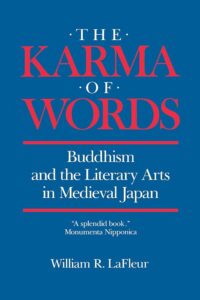In “Visions of Awakening Space and Time,” Taigen Dan Leighton quotes from William R. LaFleur’s “The Karma of Words: Buddhism and the Literary Arts in Medieval Japan.” For example:
Dōgen and the Lotus Sutra, p27In The Karma of Words, William LaFleur discusses the sophisticated nature of the Lotus Sutra as literature and its impact on medieval Japanese poetics: “The surprising feature of [the parables] in the Lotus is that they are simultaneously the vehicle and the tenor of that vehicle. In a very important sense, the parables of the Lotus are about the role and status of parabolic speech itself. They are what I would call self-reflexive allegory; that is, their trajectory of discourse behaves like a boomerang. Much like the Dharma described in a crucial section of the hōben chapter, they are characterized by ‘the absolute identity [or equality] of their beginning and end.’ ”
And, as is my want, after reading this I sent away for a copy of LaFleur’s book, which was published by University of California Press in 1986.
This book is not about the Lotus Sutra but, instead, about Medieval Japan, the period in which Nichiren lived.
LaFleur explains in his Preface to the book:
The origin of this study lies in the simultaneous frustration and fascination I felt nearly two decades ago when for the first time I saw a performance of nō drama in Japan. I was greatly moved by what I saw, but I was also greatly perplexed by the presence in this form of drama of energies, assumptions, and aesthetic values that seemed very different from those present in the classical theaters of ancient Greece and Renaissance Europe. Here was a form of drama that had evidently been shaped by a set of religious and philosophical assumptions—but these were neither those of Aristotle nor those of European Christianity. My curiosity about this led me to search for relevant books and to question people who I thought might provide information.
I soon discovered a certain consensus; it was that, although the components in nō are many and complex, it is probably Japanese Buddhism which did most to shape the world of nō. Beyond this, however, my frustration continued, since the available materials in Western languages provided information about Buddhist elements in this form of drama but stopped short of a real reconstruction of the way the Japanese in the medieval period of their history saw their world and envisioned their destinies in and through Buddhist terms and concepts. Footnotes gave definitions of things like arhats, asuras, and Amida, but these things collectively never added up to a satisfying account of the intellectual and religious assumptions of the Buddhist poets, dramatists, and writers of prose in medieval Japan.
This book is first an attempt to provide what I could not find then and was subsequently forced to pursue in the original texts and in modern scholarly studies in Japanese.
Of course, I’m less interested in nō, which I’ve never seen performed, than I am in understanding how Buddhism shaped Japan’s world view.
As a self-styled “modern Buddhist,” I was particularly taken by this observation by LaFleur:
Buddhism gained ascendency in medieval Japan largely because it successfully put forward a coherent explanation of the world and of human experience; it was the single most satisfying and comprehensive explanation available to the Japanese people at the time. This is to deny neither that Buddhism was espoused by persons who had great social and political power nor that it provided justifications for their power and prestige. Moreover, this is not to disembody it or overlook the impressive technological and artistic side of the Buddhism that came to Japan from China and Korea—its magnificent architecture, paintings, icons, vestments, illuminated scrolls, and choreographed ritual. It is merely to call attention to the cognitive dimension and to observe that Buddhism provided not only salvation but also explanation. That is, as a religion in a medieval context, it was considerably more comprehensive, than religion in modern settings. In many ways, Buddhism performed in medieval Japan much of the role now customarily assigned to science. It did so by giving to the epoch a basic map of reality, one that provided cognitive satisfaction not only to learned monks in monasteries but also to unlettered peasants in the countryside.
The Karma of Words, p26-27
Perhaps it is time for Buddhists to take back the role taken by modern science and reassert Buddhism’s “basic map of reality” – the law of cause and effect and all of its ramifications.
Over the next four days I’ll publish quotes from “The Karma of Words.”

